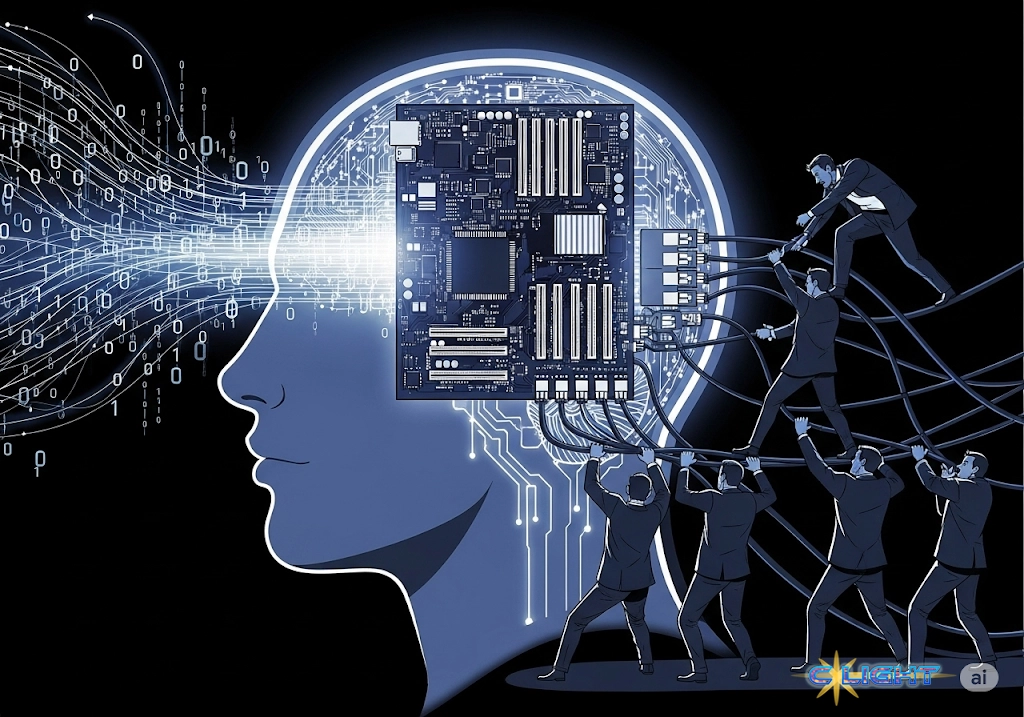Fifteen years ago, television audiences were introduced to Chuck Bartowski, a lovable, underachieving computer whiz working at a “Nerd Herd” tech support desk. Through a freak accident, the entire database of the CIA and NSA—a supercomputer called the “Intersect”—was downloaded directly into his brain. Overnight, this ordinary guy became the world’s most valuable and vulnerable intelligence asset: a Human Intersect. The government’s response was swift and absolute: they assigned handlers, locked him down, and did everything in their power to control the incredible power he now held.
It was a fun, action-comedy premise. But this week, the core of that story jumped from fiction to reality. The U.S. government has identified what it believes to be a real-life Intersect, and it is scrambling to contain it. The difference is, this Intersect isn’t a hapless guy from Burbank. It’s a powerful Chinese technology company called Quantum Horizon.
On Tuesday, in a move that sent shockwaves through the global tech industry, the U.S. Commerce Department officially added Quantum Horizon Technologies to its “Entity List,” a government blacklist that is the modern equivalent of declaring a company a threat to national security. The action effectively forbids American companies from exporting technology to Quantum Horizon, aiming to sever its access to the critical U.S. components it needs to survive.

The reason for this drastic measure, according to a statement from Commerce Secretary Gina Raimondo, is that Quantum Horizon is no ordinary company. They are pioneers in photonic processors, a revolutionary technology at the heart of quantum computing. Washington sees this not just as innovation, but as the race to build a “master key”—a quantum computer so powerful it could theoretically crack every form of encryption protecting the world’s secrets, from your bank account to the Pentagon’s classified communications. And according to the Commerce Department, Quantum Horizon has “substantial contributions to the People’s Liberation Army’s quantum computing and cryptography programs.”
In the world of Chuck, when a rival spy agency tried to get their hands on the Intersect, it was called a spy game. In the real world, it’s called a new front in the digital cold war.
Beijing’s reaction to the blacklisting was predictably furious and immediate. A spokesperson for the Ministry of Commerce didn’t bother with diplomatic pleasantries, labeling the move “blatant technological bullying” and a “gross violation of international trade rules.” They promised that China would take “all necessary measures to resolutely safeguard the legitimate rights and interests of Chinese companies.” It was the geopolitical equivalent of a rival agency declaring they would stop at nothing to get their asset back.
Caught in the middle of this high-stakes game are the handlers—in this case, the global tech industry. Like Chuck’s CIA and NSA protectors, who knew they needed him but were terrified of him falling into the wrong hands, the tech world understands the dilemma better than anyone. A statement from the Semiconductor Industry Association (SIA) acknowledged the national security concerns but warned of “increasing market uncertainty.”
This is the central paradox you astutely pointed out: for two decades, Washington has been deeply suspicious of Chinese technology. Yet, for just as long, the globalized supply chain has meant that the United States is, in many ways, reliant on its greatest rival. China possesses a level of manufacturing infrastructure and, increasingly, the high-end technical expertise that is simply unmatched in most of the world. You can’t build the next generation of technology without them, but the fear is that by working with them, you are handing them the tools to one day dominate you.

On Capitol Hill, the hardliners see no paradox at all. They view the blacklisting of Quantum Horizon as a long-overdue, necessary step. Representative John Moolenaar, the chair of the House Select Committee on the CCP, praised the move but warned that it wasn’t enough, stating that dozens of other PLA-affiliated companies “continue to operate with impunity” and urging the administration to “move faster and be bolder.”
Unlike the TV show, this story has no simple resolution, no season finale where the good guys neatly win. The blacklisting of Quantum Horizon is a messy, complicated, and risky move. It may slow down China’s progress, but it could also accelerate Beijing’s frantic push for complete technological self-reliance. It could protect American secrets, or it could simply fracture the global tech landscape into two competing, distrustful blocs.
For now, the world’s most advanced “Intersect” is on lockdown. But as any fan of Chuck knows, when an asset is this powerful, every government in the world will be trying to find a way to control it. The only difference is that this time, it’s not a TV show. It’s real.
Discover more from Clight Morning Analysis
Subscribe to get the latest posts sent to your email.










